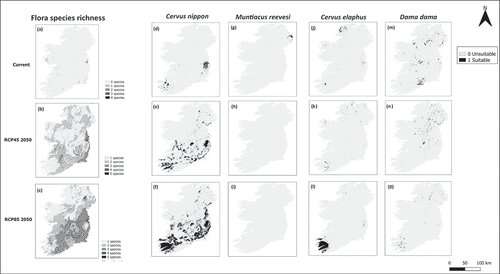This article has been reviewed according to Science X's editorial process and policies. Editors have highlighted the following attributes while ensuring the content's credibility:
fact-checked
trusted source
proofread
Research reveals impact of climate change on Ireland's flora and fauna

The impact of climate change on Ireland's nature is outlined in new research by University College Cork (UCC). Rare native plant species will go extinct and non-native sika deer will increase across Ireland, the researchers reveal.
Plants that have been part of Irish nature including Spring Vetch, Wood Crane's bill, the Nettle-leaved Bellflower and Mackay's Heath will disappear as Ireland's climate changes.
The research team, based in UCC's Department of Geography and Environmental Research Institute, used modeling, citizen science data, and climate projections to investigate the impact of climate change on Ireland's deer and 13 of our most vulnerable plant species. The research is published in the journal Annals of GIS.
Researcher at UCC and lead author James O'Mahony described the importance of the research, "We must prioritize the conservation of native flora from the potential negative impacts of both native and non-native deer species, as plants play a fundamental role in maintaining biodiversity, supporting native wildlife, ensuring the long-term resilience of our natural habitat, and protecting part of Ireland's natural heritage."
Climate change to have impact on non-native species
The research reveals that climate change will also have an impact on non-native species, such as muntjac deer. This deer, native to South Asia, is established in Northern Ireland and present in Ireland. Muntjac and fallow deer will not spread across Ireland and their herd may reduce in size under climate change, the UCC research reveals.
The researchers outline that urban green spaces may help to mitigate the negative impacts of climate change.
"Urban green spaces may help to mitigate the negative impacts of climate change and increased herbivory pressure on some of our most threatened plant species" said Dr. Paul Holloway of University College Cork. "Given the avoidance of urban centers by deer in Ireland, these areas could provide a refuge for many plant species, including endangered and vulnerable species to not only persist, but thrive under future climates. The role that citizens have embraced in rewilding these areas is a testament of local support to the biodiversity crisis."
Conservation efforts
Over 1 million species globally are threatened with extinction due to climate change, with invasive species ranked as one of the leading drivers of global biodiversity loss.
"Through understanding the population dynamics and distributions in respect to climate change, this research allows for more informed decisions and provides us with the knowledge of where to prioritize conservation and management efforts" said Adam Vanmechelen, a researcher on the project.
More information: J. O'Mahony et al, Quantifying the distribution and potential biotic interactions between deer and flora using species distribution modelling, Annals of GIS (2023). DOI: 10.1080/19475683.2023.2226196
Provided by University College Cork




















